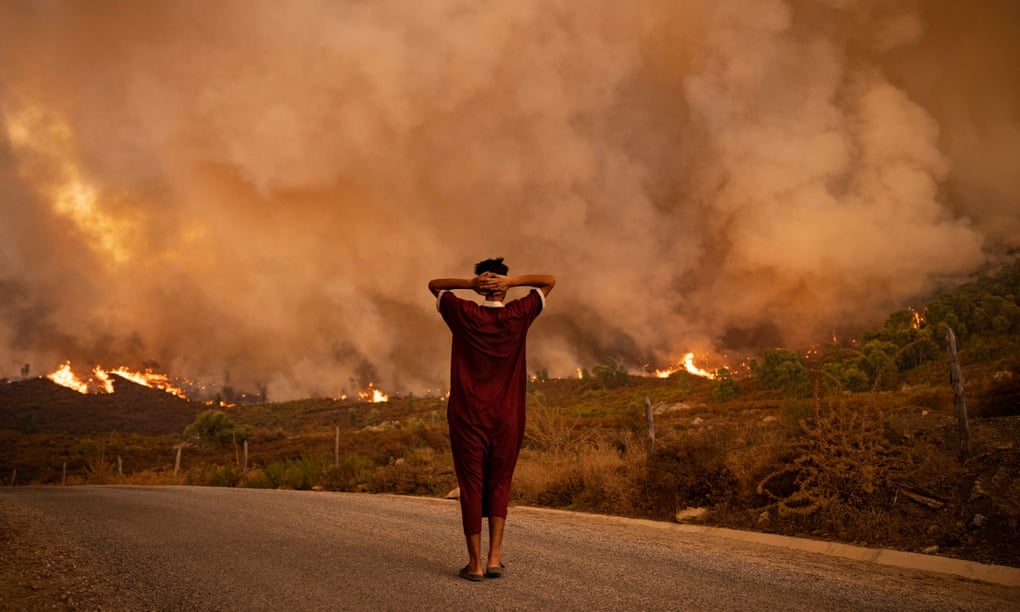11 Dec 2024

Tired Earth
By The Editorial Board

Climate breakdown is accelerating rapidly, many of the impacts will be more severe than predicted and there is only a narrow chance left of avoiding its worst ravages, the Intergovernmental Panel on Climate Change (IPCC) has said.
Even at current levels, human actions in heating the climate are causing dangerous and widespread disruption, threatening devastation to swathes of the natural world and rendering many areas unliveable, according to the landmark report published on Monday.
“The scientific evidence is unequivocal: climate change is a threat to human wellbeing and the health of the planet,” said Hans-Otto Pörtner, a co-chair of working group 2 of the IPCC. “Any further delay in concerted global action will miss a brief and rapidly closing window to secure a liveable future.”
In what some scientists termed “the bleakest warning yet”, the summary report from the global authority on climate science says droughts, floods, heatwaves and other extreme weather are accelerating and wreaking increasing damage.
Allowing global temperatures to increase by more than 1.5C above pre-industrial levels, as looks likely on current trends in greenhouse gas emissions, would result in some “irreversible” impacts. These include the melting of ice caps and glaciers, and a cascading effect whereby wildfires, the die-off of trees, the drying of peatlands and the thawing of permafrost release additional carbon emissions, amplifying the warming further.
António Guterres, the UN secretary general, said: “I have seen many scientific reports in my time, but nothing like this. Today’s IPCC report is an atlas of human suffering and a damning indictment of failed climate leadership.”
John Kerry, the US special presidential envoy for climate, said the report “paints a dire picture of the impacts already occurring because of a warmer world and the terrible risks to our planet if we continue to ignore science. We have seen the increase in climate-fuelled extreme events, and the damage that is left behind – lives lost and livelihoods ruined. The question at this point is not whether we can altogether avoid the crisis – it is whether we can avoid the worst consequences.”
The report says:
This is the second part of the IPCC’s latest assessment report, an updated, comprehensive review of global knowledge of the climate, which has been seven years in the making and draws on the peer-reviewed work of thousands of scientists. The assessment report is the sixth since the IPCC was first convened by the UN in 1988, and may be the last to be published while there is still some chance of avoiding the worst.
A first instalment, by the IPCC’s working group 1, published last August, on the physical science of climate change, said the climate crisis was “unequivocally” caused by human actions, resulting in changes that were “unprecedented”, with some becoming “irreversible”.
This second part, by working group 2, deals with the impacts of climate breakdown, sets out areas where the world is most vulnerable, and details how we can try to adapt and protect against some of the impacts. A third section, due in April, will cover ways to cut greenhouse gas emissions, and the final part, in October, will summarise these lessons for governments meeting in Egypt for the UN Cop27 climate summit.
Small islands will be among those worst affected. Walton Webson, an ambassador of Antigua and Barbuda and the chair of the Alliance of Small Island States, called the findings “cataclysmic”.
He urged the UN to convene a special session to consider action. “We are continuing to head for a precipice – we say our eyes are open to the risks, but when you look at global emissions, if anything we are accelerating towards the cliff edge. We are not seeing the action from the big emitters that is required to get emissions down in this critical decade – this means halving emissions by 2030 at the latest. It is clear that time is slipping away from us.”
Governments in other parts of the world could help their people to adapt to some of the impacts of the climate crisis, the report says, by building flood defences, helping farmers to grow different crops, or building more resilient infrastructure. But the authors say the capacity of the world to adapt to the impacts will diminish rapidly the further temperatures rise, quickly reaching “hard” limits beyond which adaptation would be impossible.
The climate crisis also has the power to worsen problems such as hunger, ill-health and poverty, the report makes clear. Dave Reay, the director of Edinburgh Climate Change Institute at the University of Edinburgh, said: “Like taking a wrecking ball to a set of global dominoes, climate change in the 21st century threatens to destroy the foundations of food and water security, smash onwards through the fragile structures of human and ecosystem health, and ultimately shake the very pillars of human civilisation.”
The report plays down fears of conflicts arising from the climate crisis, finding that “displacement” and “involuntary migration” of people would ensue but that “non-climatic factors are the dominant drivers of existing intrastate violent conflicts”.
But Jeffrey Kargel, a senior scientist at the Planetary Science Institute in the US, said: “The current warfare activity in eastern Europe, though not attributable to climate change, is a further caution about how human tensions and international relations and geopolitics could become inflamed as climate change impacts hit nations in ways that they are ill-prepared to handle.”
Source : theguardian.com
Comment